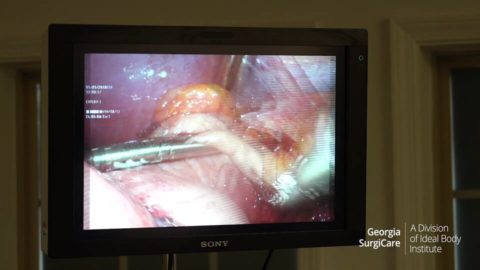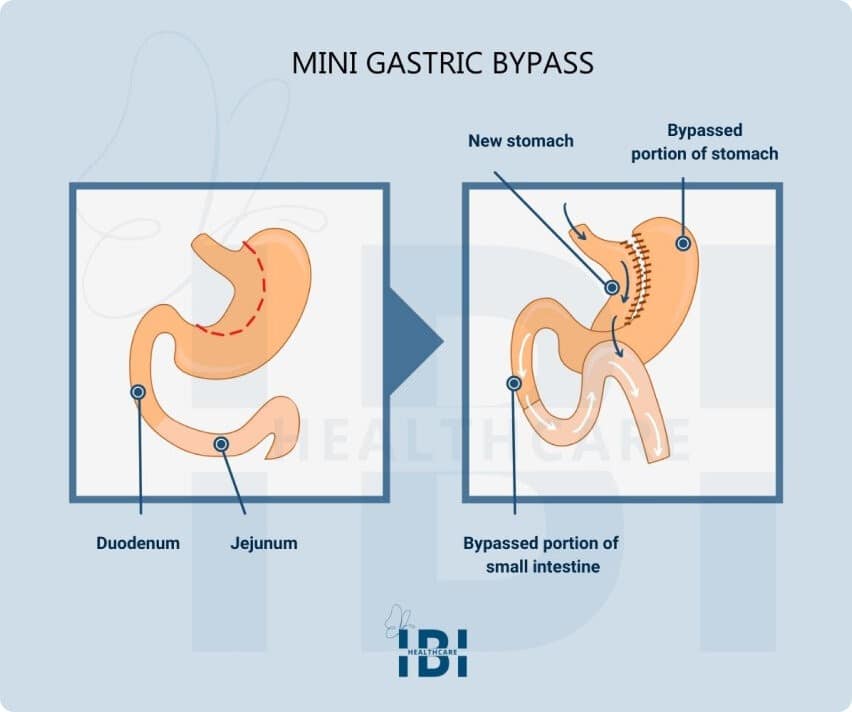What is a Mini Gastric Bypass?
Mini Gastric Bypass Surgery (Mini RYGB) helps individuals lose weight, similar to Roux-en-Y Gastric Bypass Surgery (RYGB). By comparison, the mini bypass emerged to achieve the results of gastric bypass surgery. Through a simpler technique that required less time to perform.
Moreover, during mini-bypass surgery, the surgeon makes the patient’s stomach smaller. In addition, dividing it into two unequal parts using surgical staples. Going forward, the surgeon will use the smaller portion of the stomach (about 25% of the original size). And the larger portion will remain unutilized. Furthermore, the procedure involves bypassing a large portion of the small intestine. However, it does not require as much surgical rerouting as in a traditional gastric bypass.
How do Surgeons Perform a Mini Bypass?
Firstly, under general anesthesia and utilizing a laparoscope, the surgeon performs mini-gastric bypass surgery.
Secondly, the surgeon performs the procedure using five small incisions. Made on the abdomen as access points for the insertion of special surgical instruments.
Though, with these instruments, the surgeon staples together the top of the stomach to separate it into two sections. Then, shaping one much smaller section into a tube. Additionally, the surgeon creates the new stomach, leaving the remainder of the stomach completely separate.
Lastly, the surgeon reroutes a section of the small intestine (duodenum). And part of the bowel connecting it to the new smaller stomach. Unlike gastric bypass surgery, surgeons do not remove the remaining portion of the stomach. But instead, it ceases involvement in the digestive process.



How does a Mini Gastric Bypass work?
Nevertheless, Mini RYGB surgery works through both restrictive and malabsorptive techniques. Since the surgery makes the patient’s stomach smaller. They cannot eat as much as they did before, and they feel “full” for a longer time. This constitutes a restrictive technique.
Even so, surgeons reroute a portion of the patient’s small intestine. This causes the food digested to stay in the digestive tract for a shorter duration. This inhibits the body’s ability to extract all the calories and nutrients from it before eliminating it. This is a malabsorptive technique.
Besides restricting the amount of food an individual can eat in one meal. Subsequently preventing the body from absorbing all the calories. Those ingested work together resulting in significant weight loss.

Who is a Candidate for the Procedure?
Although doctors determine candidacy for a mini bypass on a case-by-case basis. However, the general guidelines are:
Patients with a BMI of 40 or greater.
Patients with a BMI of at least 35 and are also suffering from some type of obesity-related diseases. Such as type 2 diabetes or high blood pressure.
Why Consider a Mini Gastric Bypass?
Patients who are contemplating bariatric surgery should consider a mini bypass. Due to the procedure high-yield weight loss results and low-risk factors. Undeniably, many heavier-weight individuals suffer from diseases that are related to their weight.
When individuals begin to lose weight, they often experience remission or complete elimination of these diseases or comorbidities. Nonetheless, losing weight and becoming healthier can improve a patient’s quality of life as well as their life expectancy.
What are the Benefits of a Mini Gastric Bypass?
Compared to full gastric bypass, mini bypass has the additional option to reverse the procedure if necessary.
The mini bypass requires less time under general anesthesia because it is a shorter procedure.
The mini bypass offers greater weight loss potential over a two-year period than the gastric bypass.
Losing weight offers many patients higher self-esteem levels and alleviates obesity-related depression.
Patients are able to participate in activities they were unable to prior to weight loss.
Gastric Bypass vs. Mini Gastric Bypass
| Gastric Bypass | Mini Bypass | |
|---|---|---|
| Eligibility Requirements | BMI of 40+ or 35+ at least one obesity-related comorbidity | Same as RYGB however if the patient has a history of acid reflux or GERD it may disqualify them as a candidate |
| Reversal Potential | Permanent Alterations | Eligible for revision and reversal is possible |
| Average Cost | $23,000 | $20,000 |
| Average Recovery | 4 – 6 Weeks | 2 – 3 Weeks |
| Insurance | Most Carriers Provide Coverage | Not Yet Covered By Most Carriers |
| Weight Loss Potential | 60% – 70% of excess weight after 12 months | 60% – 70% of excess weight after 12 months and surpassed RYGB patients in weight loss at the 2-year mark |
Losing weight after a mini gastric bypass can alleviate many obesity-related illnesses, including:
- Sleep Apnea.
- Heart Disease.
- Risk of Stroke.
- Type 2 Diabetes.
- High Cholesterol.
- Gallbladder Disease.
- High Blood Pressure.
- Several types of Cancer.
- Degenerative Joint Diseases.
- Osteoarthritis – cartilage breaks down in the joints.
How much Weight can I lose with the Procedure?
Similar to other Bariatric Weight Loss Surgeries, the Mini Bypass allows patients to lose weight effectively. Approximately 75% of their excess body weight over two years. Equally important, initial weight loss comparisons between full RYGB surgery and mini gastric bypass are comparable after 12 months. Whereas most patients who had a mini bypass surpassed those with gastric bypass at the 2-year mark.
Besides a mini bypass, another option for surgery less invasive than RYGB is sleeve gastrectomy. When comparing the mini bypass vs gastric sleeve, the mini GB offers more weight loss potential. Because it restricts the amount of food a patient can eat. Also limits the number of calories they can absorb.
Meanwhile, you may have heard about mini-sleeve surgery (another alternative less invasive technique). Still wondered exactly what is a mini gastric sleeve. Different bariatric practices use this term to describe a few techniques that make a patient’s stomach smaller. Regardless, one technique is to perform the gastric sleeve procedure as usual. But to only remove about 40% of the patient’s stomach. Overall, this technique reduces the necessity for as many abdominal incisions. Because it involves performing some of the procedures endoscopically.
Do Mini RYGB Procedure has Associated Risks?
Any surgical procedure presents associated risks. On the other hand, Mini Gastric Bypass Surgery presents fewer risks than other forms of bariatric surgery. But does have possible risks including:
- Ulcers.
- Gastritis.
- Acid Reflux
- Leaks at the Staple Line.
- Vitamin or Nutrient Deficiencies.
- Risks associated with the use of general anesthesia.
How much does Mini RYGB Surgery Cost?
We are currently offering the Laparoscopic Gastric Mini Bypass (OAGB) procedure at a reduced rate for a limited time. Take advantage of our limited-time special prices. Thus, the all-inclusive mini gastric bypass cost includes the price of the procedure. More importantly, the surgeon’s or specialist’s expertise, knowledge, and skill.
Additionally, IBI Healthcare Institute offers all-inclusive, self-pay pricing. In certain situations, we could offset your mini gastric bypass surgery cost. Based on health status, flexible spending accounts, or other resources. Above all, most insurance carriers do not typically cover the cost of mini-b bypass surgery. However, qualified patients can use IBI Healthcare Institute’s financing options.
How do I know if Mini RYGB Bypass Surgery is Right for Me?
In brief, to best determine if a mini bypass will provide the results you desire. You would need to consult with an expert-qualified bariatric surgeon. Simultaneously, researched the different weight loss options and available surgical procedures. Help you understand the process and prepare you for a consultation.
However, if you are considering mini gastric bypass surgery. Evidently, the experts at IBI Healthcare Institute help you navigate through your weight loss journey. Consequently, guides you in determining which procedure is best for you for ongoing support throughout the process. Contact us today accordingly. Additionally, learn more about the benefits of assisted weight loss.






